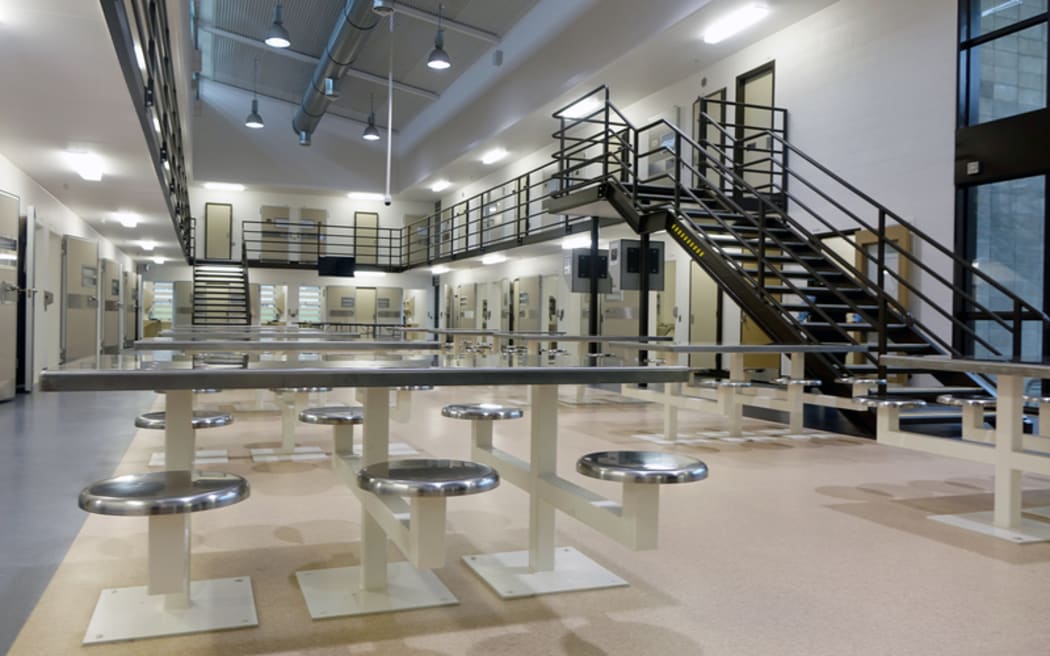Serco has been criticised for using interns to write psychological reports for the Parole Board.

A cell block at Auckland South Corrections Facility. Photo: RNZ / Kim Baker Wilson
A set of memorandums obtained by RNZ has revealed the problem, raised by the Parole Board Chair
The Parole Board has admitted the issues were first first raised 'some years ago.'
Serco is responsible for the management of Auckland South Corrections Facility (ASCF) as part of a Public Private Partnership with the Department of Corrections.
ASCF is a men's prison at Wiri holding inmates with a mix of security classifications, ranging from minimum to high. It also known as Kohuora Auckland South Corrections Facility.
In April last year the Parole Board Chair, Sir Ron Young, held a virtual meeting with Corrections Northern Regional Commissioner, Lynette Cave, and a Serco Adviser, Julie Robertson.
One other person listed as a "Senior Adviser, Northern Regional Office" attended but their name is redacted in a memorandum by Sir Ron Young.
That memorandum was released to RNZ under the Official Information Act, and described a raft of topics raised at the meeting including psychological reports.
Sir Ron Young wrote the standard of psychological reports at ASCF "generally is very poor" and said the reports provided by Serco should meet the Department of Corrections standards.
He said Serco psychologists must always interview the offender, and reports where this did not happen were unacceptable.
Sir Young also stated the Parole Board did not want reports written by interns or reports from counsellors who were not psychologists.

The Chairperson of the New Zealand Parole Board, Sir Ron Young. Photo: Aaron Smale/IKON Media
In June, Sir Ron Young sent another memorandum.
He thanked Serco Adviser Julie Robertson for her response to his April memorandum, and commented again on psychologist reports.
"So it is clear:
(a) I have previously advised Serco and Corrections that we were receiving psychological reports, typically second or third reports on offenders where the offenders have not been interviewed. It was not a case where the offenders refused to be interviewed. And so it is wrong to say that ASCF psychologists always interview men when writing reports. That is not accurate, and I have previously identified cases to Serco and Corrections where there has been no interview.
(b) ASCF psychologists are not meeting the standards agreed by the Department of Corrections and the Parole Board.
(c) Many of the reports would be less than half the length of the Corrections Psychological reports. While the length of report does not necessarily aquaint with quality, there is much information typically lacking in the psychological reports prepared by Serco. Serco has used interns to write psychological reports in the past but I agree they stopped when I objected.
The Parole Board declined RNZ's request for an interview and instead issued a statement attributed to Sir Ron Young.
In it, he confirmed recent psychological reports provided by Serco had failed to meet the standard required for parole hearings.
Sir Young said he had met with Serco to discuss the issue and they had agreed to improve their practices in line with the Deparment of Corrections.
"It is in nobody's interest to have prisoners unprepared for parole hearings.
"The provision of good quality psychological reports is a vital part of risk assessments, particularly for those offenders who have committed very serious crimes."
In a response to follow-up questions, the Parole Board issued a second statement where Sir Young said he had "first raised these issues with Serco some years ago..."
"I will be undertaking further assessment of the quality of these reports in the near future to ensure the issue is not ongoing."
RNZ approached Serco for an interview, however they also declined and sent a statement attributed to an unnamed spokesperson.
In it, a spokesperson said the timeliness of Parole Board reports had been a challenge due to several factors including a shortage of experienced case managers and psychologists.
The latter had been heavily impacted by Covid-19 border restrictions.
The spokesperson said prison transfers where there was a short time between receival and parole hearing date, and access to programmes only delivered at certain facilities had also raised challenges.
"Senior managers have met with the Chair of the NZPB to discuss his concerns and we have worked with the Department of Corrections to address these. We have also acknowledged occasions when we have been at fault and have apologised to the NZPB for this," said the spokesperson
"We are working to overcome challenges to ensuring prisoners are parole-ready, including prisoners who are transferred to Kohuora close to their parole date or prisoners who need to attend programmes addressing criminogenic behaviour which are not delivered in Kohuora and require transfer to another prison."
"We will continue to work with Corrections and NZPB to do everything possible to ensure prisoners are appropriately prepared for their Parole hearings."




